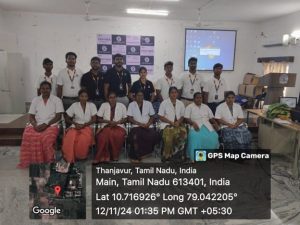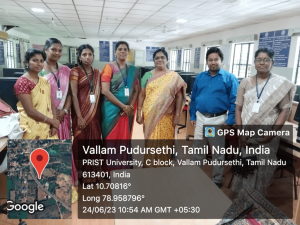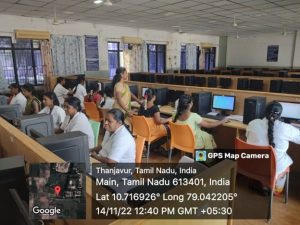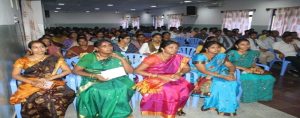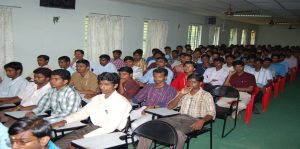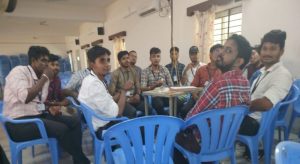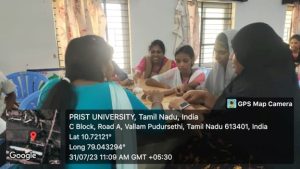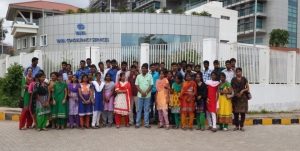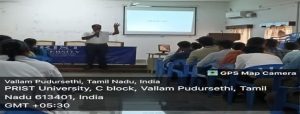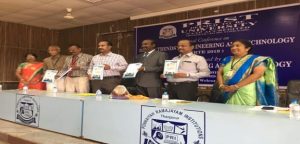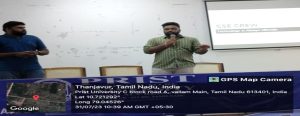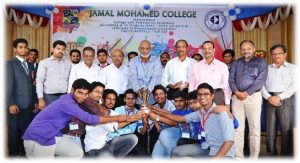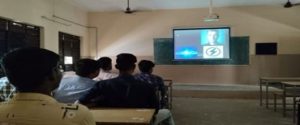Computer Science and Engineering (CSE)
The Department of Computer Science and Engineering (CSE) established in the year 2008 administers Bachelor’s programmmes in Computer Science and Engineering (CSE), CSE (AI&ML), CSE (Cyber Security) and Master’s programme in CSE. All the programmes offered are approved by AICTE, New Delhi. The primary goal of the Department is to provide best IT infrastructure, world class learning & research environment, adopt industry practices through industry collaborations and inculcate moral and ethical values.
Academic programmes offered are constantly evolving covering emerging computing fields like image processing, data science, robotics, artificial intelligence, Machine Learning and Cyber Security.
VISION :
- To become a center of excellence in computer research and education
- To create a platform for industrial consultancy
- To create a platform for industrial consultancy
- To equip students with latest skills supplemented with practical orientation
MISSION :
- To produce globally competent, quality computer professionals for the cause of development of our society.
- To enrich graduates with the knowledge, ability, and skill to become innovators and leaders.
CSE – Artificial Intelligence and Machine Learning (AIML)
B.Tech.CSE (AIML) programme in CSE [Artificial Intelligence and Machine Learning] is offered since the year 2024. The B.Tech.CSE (AIML) program is designed to provide students with a strong foundation in computer science while offering specialized knowledge in AI and ML, preparing them to tackle some of the most exciting and impactful challenges in technology today.
VISION :
- To be a center of excellence in Artificial Intelligence and Machine Learning education, driving innovation and research to produce globally competent professionals who are socially responsible and ethically grounded.
MISSION :
- Equip students with practical knowledge and skills in Computer Science and Engineering and Artificial Intelligence and Machine Learning technologies through hands-on projects and real-world applications.
- Create an innovative learning environment by integrating the latest technologies and partnering with industry to enhance educational experiences.
- Advance applied research in AIML and promote lifelong learning to support personal growth and prepare students for leadership roles.
CSE(Cyber Security)
B.Tech.CSE programme in CSE [Cyber Security] is offered since the year 2024. The department continually keeps up with the most recent technical developments and business trends to ensure that students receive the most cutting-edge and industry-relevant education possible. This department typically offers undergraduate programs that teach the principles of securing information, networks, and systems from cyber threats and attacks.
VISION :
- To be a center of academic excellence and leadership in the educational, professional and research fields of cyber security, enabling graduates technologically superior and ethically sturdy that involves the development within the quality of life in humankind.
MISSION :
- Impart comprehensive technical education to produce highly competent Cyber Security professionals, researchers and entrepreneurs capable of solving real-world cyber security threats.
- Create a project-based learning environment that promotes collaboration and teamwork in order to address global concerns while upholding moral and ethical principles.
- Develop an ecosystem for startups incubation and build the capacity to manage cyber threats by offering specialized training.
B.Tech. Computer Science and Engineering (4 Years Full Time, 3.5 Years Part Time)
PROGRAMME OUTCOMES (PO)
PO1:Engineering knowledge: Apply the knowledge of mathematics, science, engineering fundamentals, and an engineering specialization to the solution of complex engineering problems.
PO2: Problem analysis: Identify, formulate, research literature, and analyze complex engineering problems reaching substantiated conclusions using the first principles of mathematics, natural sciences, and engineering sciences.
PO3:Design/development of solutions: Design solutions for complex engineering problems and system components or processes that meet the specified needs with appropriate consideration for the public health and safety, and the cultural, societal, and environmental considerations.
PO4:Conduct investigations of complex problems: Use research-based knowledge and research methods including design of experiments, analysis and interpretation of data, and synthesis of the information to provide valid conclusions.
PO5: Modern tool usage: Create, select, and apply appropriate techniques, resources, and modem engineering and IT tools including prediction and modeling to complex engineering activities with an understanding of the limitations.
PO6: The engineer and society: Apply reasoning informed by the contextual knowledge to assess societal, health, safety, legal and cultural issues and the consequent responsibilities relevant to the professional engineering practice.
PO7: Environment and sustainability: Understand the impact of the professional engineering solutions in societal and environmental contexts, and demonstrate the knowledge of, and need for sustainable development.
PO8: Ethics: Apply ethical principles and commit to professional ethics and responsibilities and norms of the engineering practice.
PO9: Individual and team work: Function effectively as an individual, and as a member or leader in diverse teams, and in multi-disciplinary settings
PO10: Communication: Communicate effectively on complex engineering activities with the engineering community and with society at large, such as, being able to comprehend and write effective reports and design documentation, make effective presentations, and give and receive clear instructions.
PO11: Project management and finance: Demonstrate knowledge and understanding of the engineering and management principles and apply these to one’s own work, as a member and leader in a team, to manage projects and in multi-disciplinary environments.
PO12: Life-long learning: Recognize the need for, and have the preparation and ability to engage in independent and life-long learning in the broadest context of technological change.
PROGRAM SPECIFIC OUTCOMES (PSOs)
PSO1: Exhibit design and programming skills to build and automate business solutions using cutting edge technologies.
PSO2: Strong theoretical foundation leading to excellence and excitement towards research, to provide elegant solutions to complex problems.
PSO3: Ability to work effectively with various engineering fields as a team to design, build and develop system applications.
PROGRAM EDUCATIONAL OBJECTIVES (PEOs)
- Apply their technical competence in computer science to solve real world problems, with technical and people leadership.
- Conduct cutting edge research and develop solutions on problems of social relevance.
- Work in a business environment, exhibiting team skills, work ethics, adaptability and lifelong learning.
B.Tech. Artificial Intelligence and Machine Learning (4 Years Full Time)
PROGRAMME OUTCOMES (PO)
PO1: Engineering knowledge: Apply the knowledge of mathematics, science, engineering fundamentals, and an engineering specialization to the solution of complex engineering problems.
PO2: Problem analysis: Identify, formulate, research literature, and analyze complex engineering problems reaching substantiated conclusions using the first principles of mathematics, natural sciences, and engineering sciences.
PO3: Design/development of solutions: Design solutions for complex engineering problems and system components or processes that meet the specified needs with appropriate consideration for the public health and safety, and the cultural, societal, and environmental considerations.
PO4: Conduct investigations of complex problems: Use research-based knowledge and research methods including design of experiments, analysis and interpretation of data, and synthesis of the information to provide valid conclusions.
PO5: Modern tool usage: Create, select, and apply appropriate techniques, resources, and modem engineering and IT tools including prediction and modeling to complex engineering activities with an understanding of the limitations.
PO6: The engineer and society: Apply reasoning informed by the contextual knowledge to assess societal, health, safety, legal and cultural issues and the consequent responsibilities relevant to the professional engineering practice.
PO7: Environment and sustainability: Understand the impact of the professional engineering solutions in societal and environmental contexts, and demonstrate the knowledge of, and need for sustainable development.
PO8: Ethics: Apply ethical principles and commit to professional ethics and responsibilities and norms of the engineering practice.
PO9: Individual and team work: Function effectively as an individual, and as a member or leader in diverse teams, and in multi-disciplinary settings.
PO10: Communication: Communicate effectively on complex engineering activities with the engineering community and with society at large, such as, being able to comprehend and write effective reports and design documentation, make effective presentations, and give and receive clear instructions.
PO11: Project management and finance: Demonstrate knowledge and understanding of the engineering and management principles and apply these to one’s own work, as a member and leader in a team, to manage projects and in multi-disciplinary environments.
PO12: Life-long learning: Recognize the need for, and have the preparation and ability to engage in independent and life-long learning in the broadest context of technological change.
PROGRAM SPECIFIC OUTCOMES (PSO)
PSO1: Exhibit design and programming skills to build and automate business solutions using cutting edge technologies.
PSO2: Strong theoretical foundation leading to excellence and excitement towards research, to provide elegant solutions to complex problems.
B.Tech. Cyber Security (4 Years Full Time)
PROGRAMME OUTCOMES (PO)
PO1: Engineering knowledge: Apply the knowledge of mathematics, science, engineering fundamentals, and an engineering specialization to the solution of complex engineering problems.
PO2: Problem analysis: Identify, formulate, research literature, and analyze complex engineering problems reaching substantiated conclusions using the first principles of mathematics, natural sciences, and engineering sciences.
PO3: Design/development of solutions: Design solutions for complex engineering problems and system components or processes that meet the specified needs with appropriate consideration for the public health and safety, and the cultural, societal, and environmental considerations.
PO4: Conduct investigations of complex problems: Use research-based knowledge and research methods including design of experiments, analysis and interpretation of data, and synthesis of the information to provide valid conclusions.
PO5: Modern tool usage: Create, select, and apply appropriate techniques, resources, and modem engineering and IT tools including prediction and modeling to complex engineering activities with an understanding of the limitations.
PO6: The engineer and society: Apply reasoning informed by the contextual knowledge to assess societal, health, safety, legal and cultural issues and the consequent responsibilities relevant to the professional engineering practice.
PO7: Environment and sustainability: Understand the impact of the professional engineering solutions in societal and environmental contexts, and demonstrate the knowledge of, and need for sustainable development.
PO8: Ethics: Apply ethical principles and commit to professional ethics and responsibilities and norms of the engineering practice.
PO9: Individual and team work: Function effectively as an individual, and as a member or leader in diverse teams, and in multi-disciplinary settings.
PO10: Communication: Communicate effectively on complex engineering activities with the engineering community and with society at large, such as, being able to comprehend and write effective reports and design documentation, make effective presentations, and give and receive clear instructions.
PO11: Project management and finance: Demonstrate knowledge and understanding of the engineering and management principles and apply these to one’s own work, as a member and leader in a team, to manage projects and in multi-disciplinary environments.
PO12: Life-long learning: Recognize the need for, and have the preparation and ability to engage in independent and life-long learning in the broadest context of technological change.
PROGRAM SPECIFIC OUTCOMES (PSO)
PSO1: Exhibit design and programming skills to build and automate business solutions using cutting edge technologies.
PSO2: Strong theoretical foundation leading to excellence and excitement towards research, to provide elegant solutions to complex problems.
S.NO | NAME OF THE FACULTY MEMBER | DESIGNATION | QUALIFICATION |
1) | Dr.S.Nithyanandam | Professor | Ph.D., |
2) | Dr.R.Ramnath | Professor | Ph.D., |
3) | Dr.B.Naveen Kumar | Associate Professor | Ph.D., |
4) | Dr.N.Vasantha Kumar | Associate Professor | Ph.D., |
5) | Dr.S.Janaki Ramudu | Associate Professor | Ph.D., |
6) | Dr.P.Prabakaran | Associate Professor | Ph.D., |
7) | Mr.S.Amaresan | Assistant Professor | M.Tech., |
8) | Mrs.K.Jayanthi | Assistant Professor | M.E., |
9) | Mrs.M.Saraswathi | Assistant Professor | M.E., |
10) | Mr.K.Rajesh | Assistant Professor | M.E., |
11) | Mrs.M.Jeeva | Assistant Professor | M.E., |
12) | Mr.M.Vivekanandhan | Assistant Professor | M.E., |
13) | Mr.A.Vamsi | Assistant Professor | M.Tech., |
14) | Mr.G.Sankar | Assistant Professor | M.Tech., |
15) | Mr.N.Naresh | Assistant Professor | M.Tech., |
16) | Mr.Gunturu C Srisyam Sundar | Assistant Professor | M.Tech., |
17) | Mr.V.Suman Kumar | Assistant Professor | M.Tech., |
18) | Mr.M.Narendra Bhupathi | Assistant Professor | M.Tech., |
19) | Mr.S.Govindarajan | Assistant Professor | M.Tech., |
Graduates Attributes (GAs)
- Engineering Knowledge: Apply knowledge of mathematics, science, engineering fundamentals and an engineering specialization to the solution of complex engineering problems.
- Problem Analysis: Identify, formulate, research literature and analyze complex engineering problems reaching substantiated conclusions using first principles of mathematics, natural sciences and engineering sciences.
- Design/ Development of Solutions: Design solutions for complex engineering problems and design system components or processes that meet specified needs with appropriate consideration for public health and safety, cultural, societal and environmental considerations.
- Conduct investigations of complex problems using research-based knowledge and research methods including design of experiments, analysis and interpretation of data and synthesis of information to provide valid conclusions.
- Modern Tool Usage: Create, select and apply appropriate techniques, resources and modern engineering and IT tools including prediction and modeling to complex engineering activities with an understanding of the limitations.
- The Engineer and Society: Apply reasoning informed by contextual knowledge to assess societal, health, safety, legal and cultural issues and the consequent responsibilities relevant to professional engineering practice.
- Environment and Sustainability: Understand the impact of professional engineering solutions in societal and environmental contexts and demonstrate knowledge of and need for sustainable development.
- Ethics: Apply ethical principles and commit to professional ethics and responsibilities and norms of engineering practice.
- Individual and Team Work: Function effectively as an individual, and as a member or leader in diverse teams and in multi-disciplinary settings.
- Communication: Communicate effectively on complex engineering activities with the engineering community and with society at large, such as being able to comprehend and write effective reports and design documentation, make effective presentations and give and receive clear instructions.
- Project Management and Finance: Demonstrate knowledge and understanding of engineering and management principles and apply these to one‟s own work, as a member and leader in a team, to manage projects and in multidisciplinary environments.
- Life-long Learning : Recognize the need for and have the preparation and ability to Engage in independent and life- long learning in the broadest context of technological Change.
SOME RECENT PUBLICATIONS :
- Gowdham Chinnaraju and S. Nithyanandam,2023, ‘A Rule-Based Approach for Grey Hole Attack Prediction in Wireless Sensor Networks’, Intelligent Automation &Soft Computing,Vol 35, Issue 3, Page3815.
- Gowdham Chinnaraju and S.Nithyanandam, 2021, ‘Grey Hole Attack Detection and Prevention method in wireless Sensor Networks’, Tech Science Press.ISSN:0267-6192 volume 42, Issue 1, Pages 373-386.
- Gowdham Chinnaraju and S.Nithyanandam, ‘Modeling of an Efficient light Weight resistive Mechanism for Grey Hole attack Prediction in Wireless Sensor Networks’, Journal of Natural Volatiles &Essential oil, ISSN:2148-9637,Vol 8,Issue5,Pages 1821-1843.
- Latha, S.JancySickory Daisy 2022, ‘Helmet usage analysis using deep learning’ International Journal of Engineering and Technology, Vol 7, ISSN 2278,Pages 24-29.
- JancySickory Daisy, Elsevie, 2021 ‘Smart material to build mail spam filtering technique using Naive Bayes and MRF methodologies’Materials Today Proceedings,Vol. 47, Pages 446-452.
- Latha, 2021, Data hiding with encrypted multisharing using modified LSB technique’ International Journal of Engineering Research & Technology (IJERT), ISSN: 2278-0181, Vol. 10 ,Issue 02, Pages 135-140.
- JancySickory Daisy, 2019, ‘Various approaches of machine learning and non-machine learning techniques’ JETIR, Vol 6, Issue 5, Pages 46-50.
- Latha, 2019, ‘An efficient power aware monitoring system using wireless sensor network’ Journal of Emerging Technologies and Innovative Research, ISSN 2349 5162, Vol 5, Pages 1-6.
- JancySickoryDaisy, 2019, Hybrid Spam Filtration Method using Machine Learning Techniques’ International Journal of Innovative Technology and Exploring Engineering (IJITEE), ISSN: 2278-3075,Vol-8, Issue-9,Pages 1818-1821.
- Vijayasaro, S.Nithyanandam and N.Pravatham, 2018. ‘A Novel Development of Wireless Mesh Protocol Data Transmission Framework for Internet Based Energy Conservation’, Institute of Thermomechanics CAS, Acta Technica 63 No. 1B, Pages 1-8.
- Pradeep Udupa and S.Nithyanandam, 2018, ‘An Efficient Software Testing by Test Case Reduction, Prioritization and Parallelization’, International Journal of Pure and Applied Mathematics, Volume 118 No. 22, Pages 1879-1885.
- Vijayasaro, S.Nithyanandam and N.Pravatham, 2018, ‘An IoT based Real Time Implementation solution for Energy Crisis using Bluetooth’, International Journal of Pure and Applied Mathematics, Volume 117 No. 20, Pages 1
SEED MONEY GRENTED BY PRIST
S.No. | PROJECT TITLE | FACULTY | GRANT IN Rs. |
1. | SMO Compliance and Ethics: Best Practices in Data Privacy and User Engagement | Dr. R. Latha | 8.51 |
2. | Fashion Forecasting and Trend Analysis for Garment Design and Production | Dr.A.Jahir Husain | 12.88 |
3. | Cargo Handling Equipment Automation: Robotics and AI Applications | Dr. S.Nithyanandam | 11.27 |
4. | Optimizing Food Production Efficiency Through IoT-Enabled Kitchen Management Systems | Dr. S.Nithyanandam | 4.50 |
5. | Cloud-Based Catering Management Software for Seamless Operations | Dr.A.N.Arularasan | 4.70 |
6. | SEO for Visual Content: Image and Video Optimization Techniques | Dr.L.S. Usharani | 1.60 |
7. | SEO A/B Testing and Experimentation for Performance Optimization | Dr.R Latha | 2.40 |
8. | Cloud-Based Media Distribution Platforms for Scalable Content Delivery | Dr.S.Nithyanandam | 2.20 |
9. | Development and deployment of high conformance management information system (MIS) framework based on process data mining of customer / guest database | Dr.Latha | 2.50 |
10. | Secure Multicast Routing Using IoT | Dr. R.Latha | 3.00 |
11. | Automated Paddy Leaf Disease Detection | Mr.S.Amaresan | 2.20 |
12. | Performance Model Of Map reduce Iterative Application For Hybrid Cloud Bursting | Mrs.S.Jancy Sickory Daisy | 1.40 |
13. | Connecting Social Media E-Banking System | Mrs.R.Banumathi | 2.90 |
14. | Modern Agricultural Development System | Mrs.K.Jayanthi | 2.50 |
15. | Performance Improvement In Cloud Computing Through Dynamic Task Scheduling Algorithm | Mrs.S.Gayathri | 1.70 |
16. | Comment Analysis In Social Network Using Machine Learning Techniques | Mrs.G.S.Saranya | 1.80 |
17. | Fake Profile Identification Using SVM | Mrs.S.G.Kanimozhi | 2.20 |
18. | Dynamic Dispersal Model Of Trafficking Machine Failures In Lifetime Copper Manufacturing Industry | Mr.T.Balasthuragiri | 1.10 |
19. | Prediction Of Emotion Apprehension Entity Concession | Mr.S.Sureshkumar | 2.60 |
20. | Probabilistic Aspect Mining Model In Medical Query | Mrs.V.Gayathri | 1.60 |
21. | Deep Learning For Cyber Security | Mrs.N.Dhivya | 3.00 |
22. | Revelation Of Compounded Abrading Flaws By Ensemble Learning Strategy | Mrs.M.Mohanapriya | 2.50 |
23. | Sustainable RDBMS Bid Data From Auctioning Application | Mrs.M.Jeeva | 1.40 |
24. | Diligent Transaction Of Inventory And Invulnerable To Conduct Service | Ms.M.Vaishnavi | 1.50 |
25. | Securing Data and Providing Privacy Assurance Using Revocation in Distributed cloud server | Mrs.S.Gayathri | 2.10 |
26. | Sign Language to Text for Deaf and Dumb | Mr.T.Balasthuragiri | 1.20 |
27. | Software privacy Protection (To Process software privacy Protection using MAC address) | Mr.S.Sureshkumar | 1.80 |
28. | Exchanging Secured Data in Cloud using File Cryptography and Quick Response OTP | Mrs.V.Gayathri | 2.60 |
29. | Application for Collage Management System | Mrs.M.Mohanapriya | 1.60 |
30. | A Computational Intelligent Approach for Detection of Diseases in Rice Leaf | Mrs.M.Jeeva | 1.90 |
31. | Power consumption and prediction using Machine Learning | Mrs.N.Dhivya | 1.80 |
32. | Real Time Obstacle Avoidance and path planning for limbed locomotive Robust in rough terrains | Mrs.G.S.Saranya | 2.90 |
33. | Sign Language Recognition system using Convolutional Neural Network | Mrs.S.G.Kanimozhi | 1.70 |
34. | Block chain Technology for Secure Cargo Tracking | Dr.LS Usharani | 2.3 |
35. | Reducing Carbon Footprint in Cargo Transport Operations | Dr.A.N.Arularasan | 3.0 |
36. | Development of Smart Sensors for Real-Time Cargo Monitoring | T.Balasathuragiri | 4.0 |
37. | Predictive Analytics for Cargo Demand Forecasting | M.Jeeva | 6.3 |
38. | Optimization of Cold Chain Logistics for Perishable Goods | Dr.A.Jahir Husain | 3.6 |
39. | Cybersecurity Measures for Protecting Cargo Data | S.Amaresan | 4.5 |
40. | Use of Drones for Cargo Delivery in Remote Areas | K.Sangeetha | 3.3 |
41. | Implementing IoT in Cargo Fleet Management | Dr.S.Nithyanandam | 4.7 |
42. | Current Trends in Cyber Security Awareness Among SMEs | Dr.A.Jahir Husain | 0.5 |
43. | Challenges in Full Stack Development for Startups | R.Banumathi | 0.5 |
44. | AI-Driven Predictive Analytics for Customer Behavior | Dr.A.Jahir Husain | 6.9 |
45. | Block Chain Technology for Secure Data Transactions | KSangeetha | 6.1 |
46. | Machine Learning Algorithms for Cybersecurity Threat Detection | S.Jancy Sickory Daisy | 4.9 |
47. | Developing Scalable Cloud-Based Solutions for Big Data | Dr.S.Nithyanandam | 2.0 |
48. | IoT-Enabled Smart Cities: Integration and Data Management | Dr.S.Samundeeswari | 4.40 |
CONSULTANCY
S.No.
| PROJECT TITLE | FACULTY | SPONSORING AGENCY |
1. | IoT-Based Integrated Smart Security System | Dr S. Nithyanandam, | Flash ID Technologies, Thanjavur |
PATENTS
S.No. | INVENTOR(S) &PATENT TITLE | APPLICATION NUMBER | DATE FILLED | FILED(F) /PUBLISHED(P) /GRANTED(G) |
1. | Dr S Nithyanandam | 202241040522 | 8/26/2022 | PUBLISHED |
2. | Dr S Nithyanandam | 202241040784 | 7/22/2022 | PUBLISHED |
3. | Dr. K. Padmapriya | 202141008642 | 3/12/2021 | PUBLISHED |
4. | Dr.S. Devi | 202141030909 | 7/16/2021 | PUBLISHED |
5. | Dr.S.Devi | 202041002997 | 1/31/2020 | PUBLISHED |
6. | Dr. S.Samundeeswari | 201941053565 | 1/3/2020 | PUBLISHED |
SPONSORED RESEARCH PROJECTS
S.No. | PROJECT TITLE | FACULTY | SPONSORING AGENCY |
1. | Cargo Handling Equipment Automation: Robotics and AI Applications | Dr.S.Nithyanandam | Uni Link Cargo |
2. | Optimizing Food Production Efficiency Through IoT-Enabled Kitchen Management Systems | Dr.S.Nithyanandam | Sri Chendhoor & Co |
3. | Cloud-Based Media Distribution Platforms for Scalable Content Delivery | Dr.S.Nithyanandam | Voqzi Media Pvt Ltd |
4. | Implementing IoT in Cargo Fleet Management | Dr.S.Nithyanandam | Uni Link Cargo |
5. | Developing Scalable Cloud-Based Solutions for Big Data | Dr.S.Nithyanandam | AMBC Technologies |
6. | Optimization of Cargo Loading Processes Using AI and Machine Learning | Dr.S.Nithyanandam | Uni Link Cargo |
7. | SMO Compliance and Ethics: Best Practices in Data Privacy and User Engagement | Dr. R. Latha | AMBC Technologies |
8. | SEO A/B Testing and Experimentation for Performance Optimization | Dr.R Latha | AMBC Technologies |
9. | Development and deployment of high conformance management information system (MIS) framework based on process data mining of customer / guest database | Dr.Latha | Bismi Imports and Exports |
10. | Secure Multicast Routing Using IoT | Dr.R.Latha | Sri Ponnaiyah Ramajayathammal Educational and Charitable Trust |
11. | Cloud-Based Catering Management Software for Seamless Operations | Dr.A.N.Arularasan | Sri Chendhoor & Co |
12. | Reducing Carbon Footprint in Cargo Transport Operations | Dr.A N Arularasan | Uni Link Cargo |
13. | Modern Agricultural Development System
| Mrs.K.Jayanthi
| Sri Ponnaiyah Ramajayathammal Educational and Charitable Trust |
14. | Sustainable RDBMS Bid Data From Auctioning Application | Mrs.M.Jeeva | Sri Ponnaiyah Ramajayathammal Educational and Charitable Trust |
15. | A Computational Intelligent Approach for Detection of Diseases in Rice Leaf | Mrs.M.Jeeva | Sri Ponnaiyah Ramajayathammal Educational and Charitable Trust |
16. | Predictive Analytics for Cargo Demand Forecasting | M.Jeeva | Sri Ponnaiyah Ramajayathammal Educational and Charitable Trust |
17. | Performance Model Of Map reduce Iterative Application For Hybrid Cloud Bursting | Mrs.S.Jancy Sickory Daisy | Sri Ponnaiyah Ramajayathammal Educational and Charitable Trust |
18. | Performance Improvement In Cloud Computing Through Dynamic Task Scheduling Algorithm | Mrs.S.Gayathri | Sri Ponnaiyah Ramajayathammal Educational and Charitable Trust |
19. | Probabilistic Aspect Mining Model In Medical Query | Mrs.V.Gayathri | Sri Ponnaiyah Ramajayathammal Educational and Charitable Trust |
20. | Deep Learning For Cyber Security | Mrs.N.Dhivya | Sri Ponnaiyah Ramajayathammal Educational and Charitable Trust |
21. | Revelation Of Compounded Abrading Flaws By Ensemble Learning Strategy | Mrs.M.Mohanapriya | Sri Ponnaiyah Ramajayathammal Educational and Charitable Trust |
22. | Securing Data and Providing Privacy Assurance Using Revocation in Distributed cloud server | Mrs.S.Gayathri | Sri Ponnaiyah Ramajayathammal Educational and Charitable Trust |
23. | Exchanging Secured Data in Cloud using File Cryptography and Quick Response OTP | Mrs.V.Gayathri | Sri Ponnaiyah Ramajayathammal Educational and Charitable Trust |
24. | Application for Collage Management System | Mrs.M.Mohanapriya | Sri Ponnaiyah Ramajayathammal Educational and Charitable Trust |
25. | Power consumption and prediction using Machine Learning | Mrs.N.Dhivya | Sri Ponnaiyah Ramajayathammal Educational and Charitable Trust |
26. | Cybersecurity Measures for Protecting Cargo Data | S.Amaresan | Uni Link Cargo |
27. | Machine Learning Algorithms for Cybersecurity Threat Detection | S.Jancy Sickory Daisy | AMBC Technologies |
28. | Natural Language Processing for Enhanced User Interactions | V.Gayathri | AMBC Technologies |
- 2021-2022 – Ms.G.Krithiga – ‘Best Researcher Award’ from PRIST Deemed to be University.
- 2019-2020 – Ms.M.R.Geetha – Junior Research Fellow (JRF).
- 2019-2020 – Ms.A.Sowmiya – Junior Research Fellow (JRF) PRIST Deemed to be University.
- 2018-2019 – Dr.S.Sanjeevi Kumar – ‘Best Researcher Award’ from PRIST Deemed to be University.
- 2017-2018– Dr.B.Kunjithapatham -‘Best Researcher Award’ from PRIST Deemed to be University
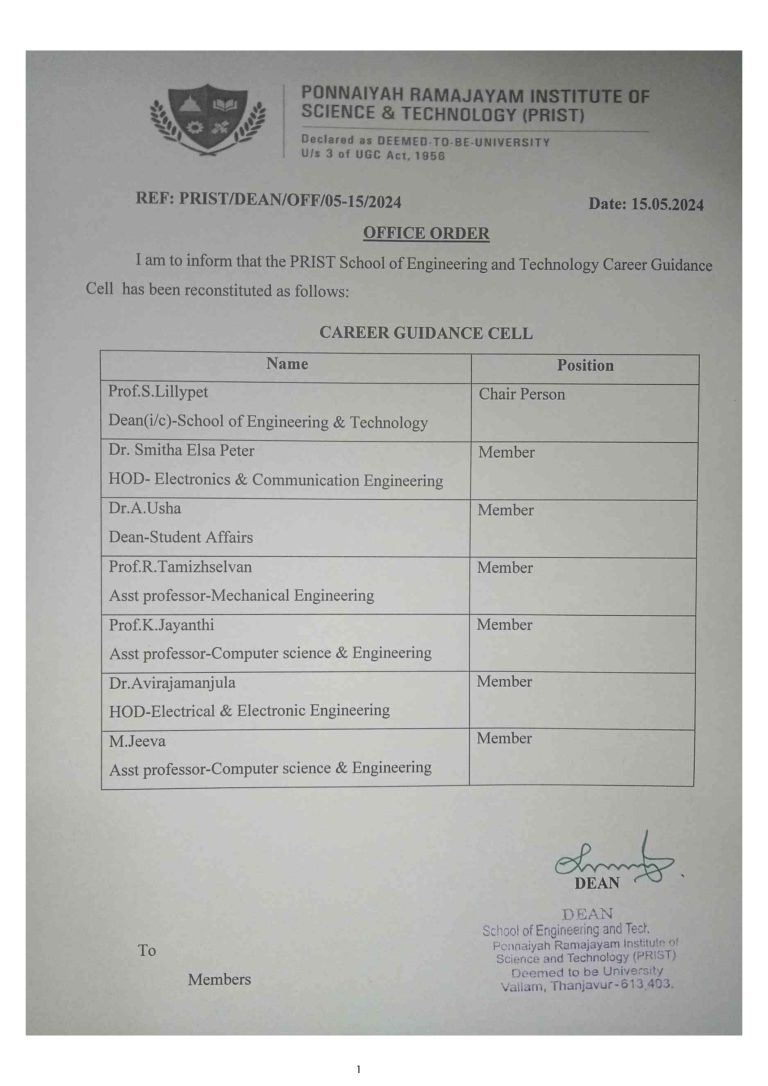
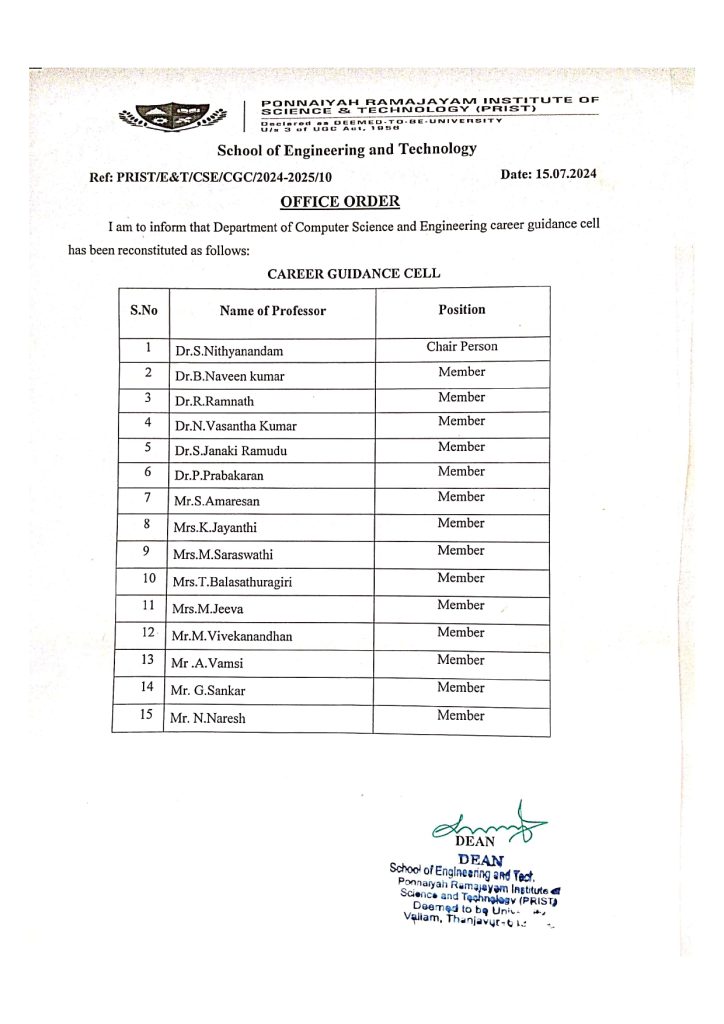
On September 19, 2023, a National Level Workshop on “Artificial Intelligence Using Deep Learning” was conducted, featuring Mr. R. Palaniappan, Managing Director, and Miss Abinaya, Programmer at Info systems, Thanjavur. The workshop provided participants with an in-depth understanding of deep learning concepts and their applications in artificial intelligence. Mr. Palaniappan introduced the fundamentals of AI and neural networks, while Miss Abinaya led practical sessions using frameworks like Tensor Flow and Keras. Participants engaged in hands-on exercises, enhancing their skills in building and training neural networks. The event fostered interaction and networking, inspiring attendees to explore the vast possibilities of AI in technology. .Read more
On September 25, 2023, the Department of Computer Science and Engineering (CSE) organized a vibrant Engineers Day event to celebrate the contributions of engineers to society. The day featured engaging guest lectures by industry professionals and esteemed alumni, who shared insights on emerging trends and career opportunities in engineering. Interactive workshops allowed students to explore cutting-edge technologies, while competitions fostered creativity and teamwork. A panel discussion focused on the future of engineering and sustainable practices. The event concluded with a prize distribution ceremony, recognizing outstanding participants and inspiring students to excel in their engineering endeavors..Read more
On August 25, 2023, our department organized the “Technical Quiz 2K23,” an engaging event aimed at testing participants’ knowledge in various technology and engineering domains. The quiz featured a series of challenging questions covering topics such as computer science, electronics, and emerging technologies. Students formed teams to compete for exciting prizes, fostering a spirit of collaboration and healthy competition. The event not only encouraged participants to showcase their expertise but also promoted learning in a fun and dynamic environment. “Technical Quiz 2K23” successfully inspired students to deepen their understanding of the rapidly evolving tech landscape..Read more
On August 22, 2023, Dr. M. Malathy, a Professor in the Department of Computer Science and Engineering at Vel Tech Hi Tech Dr. RR Dr. SR Engineering College in Avadi, Chennai, conducted an engaging webinar on “Data Science and Data Analytics.” The session explored essential concepts, methodologies, and tools used in the field, highlighting their relevance in today’s data-centric landscape. Dr. Malathy provided real-world examples to illustrate the practical applications of data science and analytics across various industries. Participants were encouraged to engage in discussions, fostering a collaborative learning environment that enriched their understanding of these crucial topics..Read more
On July 31, 2023, a thought-provoking guest lecture titled “Positive Future” was delivered by Mr. C. Bhuvaneshwran, Senior Business Analyst at ITC InfoTech in Bangalore, and Mr. M. C. Naveen, Founder of 7 Angle in Thanjavur. The session focused on fostering a positive outlook in the face of challenges and leveraging opportunities in today’s dynamic environment. Speakers shared their insights on the importance of resilience, innovation, and adaptability in professional growth. They discussed strategies for navigating uncertainties and emphasized the role of technology and entrepreneurship in shaping a brighter future. The engaging dialogue inspired participants to envision their potential contributions to a more optimistic world.Read more
On June 27, 2020, Mr. Sudharsan, a trainer from CADD India Pvt Ltd, conducted an enlightening seminar titled “Empowering Future Within the Scope of Engineering & Technology.” The session focused on the dynamic interplay between engineering and technology, emphasizing how emerging trends can shape a more empowered future. Mr. Sudharsan shared insights into the latest innovations and tools in the field, highlighting the importance of skill development and practical training. Attendees were encouraged to engage in discussions about the role of technology in solving global challenges and the need for interdisciplinary approaches in engineering education. The seminar concluded with an interactive Q&A, inspiring participants to envision their potential contributions to the evolving landscape of engineering and technology.Read more
On December 26, 2020, an online alumni meeting was held, bringing together graduates from various years. The event featured presentations on recent alumni initiatives and updates from the association, fostering engagement and community spirit. Attendees participated in breakout sessions, discussing career advancements, networking strategies, and opportunities for collaboration. The meeting provided a platform for alumni to share their experiences and insights, strengthening connections among participants. A Q&A segment allowed for interactive discussions, encouraging feedback and ideas for future events. Overall, the meeting was a successful opportunity for alumni to reconnect and support each other’s professional journeys. Read more
The seminar on “Mobile Communication,” led by A. Arul Mohan, Director of AGB Infratel Private Ltd, took place in Chennai on June 22, 2019. The event brought together students, professionals, and academics to explore the advancements in mobile communication technologies. Arul Mohan provided a comprehensive overview of the industry’s evolution, discussing the transition from 4G to the anticipated 5G rollout. He highlighted the importance of infrastructure development to meet growing demands and addressed challenges such as regulatory frameworks and the integration of the Internet of Things (IoT). The seminar fostered engaging discussions and networking opportunities, enriching participants’ understanding of this dynamic field. Read more
The One Day Workshop on “Python for Teachers” took place at the Teaching Learning Centre, IIT Bombay, on June 22, 2019. Designed for educators, the workshop aimed to introduce participants to Python, a versatile programming language. Attendees engaged in hands-on sessions covering Python fundamentals, including data types, control structures, and functions, guided by experienced instructors. The workshop emphasized the integration of computational thinking into teaching practices, encouraging educators to apply programming concepts across various subjects. Participants also shared ideas on best practices and resources for teaching Python, ultimately enhancing their skills and equipping them to foster a tech-savvy learning environment for their students. Read more
- The NCRTE-2K19, or National Conference on Recent Trends in Engineering, took place on April 11, 2019, featuring Dr. M. Duraiselvam, a prominent professor from the National Institute of Technology (NIT). The conference gathered academics, industry professionals, and students to explore innovative advancements in engineering. Dr. Duraiselvam delivered an insightful keynote address on the impact of emerging technologies, such as artificial intelligence and automation. Attendees engaged in discussions on sustainable engineering practices, smart materials, and the Internet of Things (IoT). The event fostered collaboration and networking, inspiring participants to embrace new trends and methodologies in the ever-evolving engineering landscape . Read more
Head, Department of Computer Science & Engineering,School of Engineering and Technology,
PONNAIYAH RAMAJAYAM INSTITUTE OF SCIENCE & TECHNOLOGY(PRIST), Vallam, Thanjavur -613403.
Email: hodcse@prist.ac.in
Phone: 04362-265021

